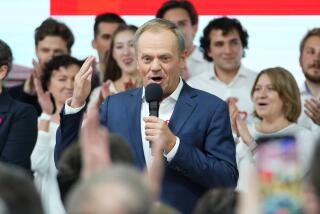Warsaw Backs Legalization of Solidarity on Stiff Terms
- Share via
WARSAW — Poland’s Communist Party Central Committee early today accepted a proposal that could pave the way for legalization of the banned Solidarity trade union, but it attached such stringent conditions that it seemed unlikely to bring about a quick reinstatement of the union.
The proposal, set forth by Premier Mieczyslaw F. Rakowski, represents the thinking of the party Politburo, but even with the conditions attached it ran into stiff resistance in the Central Committee, and debate on the matter continued until nearly 3 a.m.
The government news agency said that a majority of the Central Committee accepted the proposal after a heated 17-hour debate, but it is not likely that Solidarity will accept the conditions laid down by the government. The party leadership’s plan as outlined by Premier Rakowski includes a two-year moratorium on strikes, a renunciation of “radical” opposition groups and a declaration by the union that it is “an integral part of socialism.”
A Solidarity source in Warsaw characterized the offer as unacceptable or even “laughable.”
Rakowski, premier since October, has been pushing to win broader public support for his new government, which is perceived by many observers here to be on shaky ground already.
The government has been attempting since August to draw the Solidarity leadership closer, but this is the first time that the party Central Committee has been asked to approve an alliance with its longstanding opposition force.
Rakowski proposed that Solidarity be provisionally recognized for a two-year trial period, during which the union and the government would “gather positive and negative experiences.”
Obviously addressing hard-liners in the 230-member Central Committee, the premier stressed that the union would have to pledge not to strike and to give up the financial assistance it receives from the U.S. Congress, which amounts to about $1 million a year.
“We have to gain certainty that this (new) Solidarity, which cannot be a simple re-creation of the old one, does not pull the country into anarchy,” Rakowski said.
Solidarity activists, in initial and unofficial reaction to the proposal, said they doubted that the union leadership could accept the conditions.
“The government wants to pull the teeth out of Solidarity and bring it inside with them,” one union activist said. “It is not our duty to fight the government’s battles.”
There was no immediate comment from Lech Walesa, the Solidarity leader, who was meeting with union activists in Gdynia in northern Poland.
Making his proposal, which was broadcast on television, Rakowski said he was putting a series of direct questions to the Solidarity leadership, and he said the answers will determine whether the union will take steps toward legalization or remain a “political opponent with whom one has to carry on constant struggle.”
He asked if Solidarity was willing to renounce more militant opposition groups such as Fighting Solidarity and the Confederation for an Independent Poland. He asked if Solidarity would continue to act as a foreign agent by accepting money from the U.S. Congress and other foreign sources.
“I am putting all these questions in an unambiguous way because I am avoiding any kind of ambiguity,” Rakowski said. “The questions are too serious to allow ambiguities.”
He said the economic problems of Poland require order and peace, and cannot be solved “if the economy becomes a field of political struggle.”
Television coverage of the Central Committee meeting ended after Rakowski’s speech, but there were indications that a heated debate was under way in a closed session. Party secretary Leszek Miller told state television that a verbal duel took place between Rakowski and Alfred Miodowicz, leader of the official trade union federation.
On Tuesday, radio broadcasts of the meeting suggested that a minority of higher-ranking party officials were speaking out in support of recognizing Solidarity and that a larger number of the Central Committee members, generally more conservative, were opposed.
A party leader representing a copper mine in southern Poland, Jan Turzynski, said he was opposed to opening discussions with groups that accept Western aid. Bogdan Kolomyjiski, manager of the Katowice Steel Mill, said the introduction of competing trade unions could bring “anarchy and divided work crews.”
“Other trade unions are not necessary to bring change,” said Eugeniusz Kawalec, the head of an agricultural cooperative near Czestochowa. “Already today many comrades say that the (official unions) are constructive opposition to the government and the economic administration. We will not have more bread if we have more trade unions.”
Party officials say such comments reflect deep-running fears of the party’s embattled conservatives that any accommodation with Solidarity represents a step toward reform that would eventually lead to their fall from privileged positions.
The reformers feel that their plans for revamping the economy, which would bring even greater hardship to an already hard-pressed society, cannot succeed without the broader base of support that Solidarity would represent.
More to Read
Sign up for Essential California
The most important California stories and recommendations in your inbox every morning.
You may occasionally receive promotional content from the Los Angeles Times.













